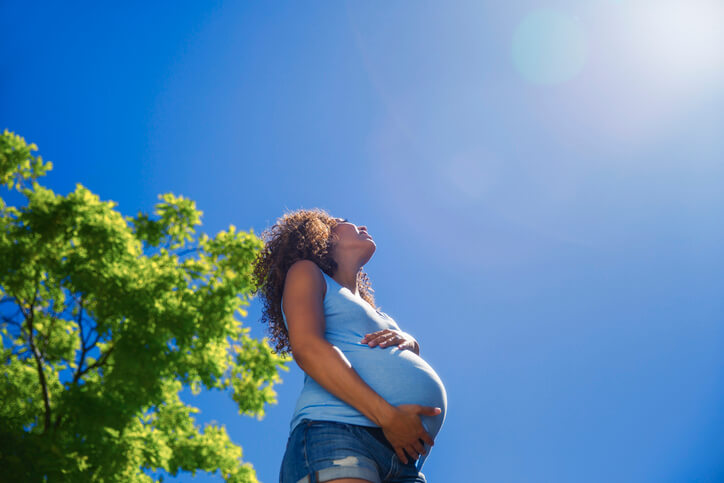Are You Pregnant? You Need to Read This About Vitamin D
7 years ago | Nutrition
By Joy Stephenson-Laws, JD, Founder
Vitamin D is one of the nutrients you need to stay healthy. As you may already know, it is sometimes referred to as the ‘sunshine vitamin’ because it is made with the help of the sun.
According to the National Institutes of Health (NIH), “Vitamin D is unique because it can be made in the skin from exposure to sunlight. Vitamin D exists in two forms. Vitamin D2 is obtained from the UV irradiation of the yeast sterol ergosterol and is found naturally in sun-exposed mushrooms. UVB light from the sun strikes the skin, and humans synthesize vitamin D3, so it is the most ‘natural’ form. Human beings do not make vitamin D2…”
Vitamin D is actually considered to be a hormone by some in the medical community.
“The body synthesizes it after sun exposure, and it's activated by the liver and kidneys. That activated form again acts like a hormone to regulate calcium metabolism.”
Whether you view vitamin D as a hormone or not, very few foods in nature contain vitamin D. There are some products in the grocery store, like orange juice, which are fortified with vitamin D, but you mainly have to depend on the sun in order to get an adequate, natural intake of vitamin D.
Many people may be vitamin D deficient, because they live in a climate with limited sunlight year-round or spend a lot of time indoors. According to the NIH, vitamin D deficiency affects almost 50% of the population worldwide and an estimated one billion people worldwide. Furthermore, vitamin D is a critical nutrient for pregnant women because it is necessary for the health of a growing fetus.
“At this time, 40-60% of the entire U.S. population is vitamin D deficient, including pregnant women,” reports the American Pregnancy Association.
“Vitamin D invests in the well-being of your baby by supporting healthy bone development. Deficiency with vitamin D is also related to preeclampsia.”
And now researchers found evidence that newborns who are vitamin D deficient have an increased risk of developing schizophrenia later in life. Schizophrenia is a chronic and severe mental disorder. A person with this disorder may not be able to tell what is real versus what is fake and suffer from hallucinations, among many other issues.
Schizophrenia is actually a pretty rare condition in the United States, reportedly affecting only one percent of the U.S. population. But if we take into account that a nutritional deficiency in newborn babies could increase this rate, it makes schizophrenia much more of a threat and something we need to be proactive about.
The researchers found that newborns with vitamin D deficiency had a 44 percent increased risk of being diagnosed with schizophrenia as adults compared to those with normal vitamin D levels.
“As the developing foetus is totally reliant on the mother's vitamin D stores, our findings suggest that ensuring pregnant women have adequate levels of vitamin D may result in the prevention of some schizophrenia cases, in a manner comparable to the role folate supplementation has played in the prevention of spina bifida," said one of the lead researchers, in a report about the study.
“We hypothesised that low vitamin D levels in pregnant women due to a lack of sun exposure during winter months might underlie this risk, and investigated the association between vitamin D deficiency and risk of schizophrenia."
Clearly, pregnant women need to make sure they are not deficient in vitamin D. And if you are pregnant and taking a prenatal vitamin (which contain many vitamins and minerals such as folate, iron, magnesium, choline, vitamin B12 and vitamin D3 ), this still may not be enough to get your vitamin D needs.
“It is unlikely your prenatal vitamin provides enough vitamin D,” reports the American Pregnancy Association.
“A recent study found women taking 4,000 IU of vitamin D daily had the greatest benefits in preventing preterm labor/births and infections. The study confirmed vitamin D at this level is not only safe for you, but for your baby, and the researchers from this study now recommend this daily dosage of vitamin D for all pregnant women.”
We don’t have definitive proof of this, but perhaps 4,000 IU of vitamin D daily will also help decrease the risk of a baby eventually develop schizophrenia. The main takeaway is that we never want to be deficient in any essential nutrient. And a growing fetus has no choice but to depend on the nutrients the expecting mother supplies. As a result, it is important for pregnant women to be proactive about their vitamin D levels.
One way to be proactive about your vitamin D levels is to take a nutrient test. If the test reveals you are deficient in vitamin D (or any other nutrient), a competent healthcare professional can suggest dietary changes or help you find a quality supplement, especially if you are a pregnant woman.
Tell your doctor you are especially concerned about being vitamin D deficient as a pregnant woman. The more vocal and specific you are, the better you and your doctor can work as a team to ensure the health of your unborn baby.
Enjoy your healthy life!
The pH professional health care team includes recognized experts from a variety of health care and related disciplines, including physicians, attorneys, nutritionists, nurses and certified fitness instructors. This team also includes the members of the pH Medical Advisory Board, which constantly monitors all pH programs, products and services. To learn more about the pH Medical Advisory Board, click here.







